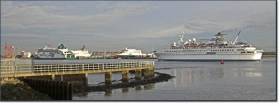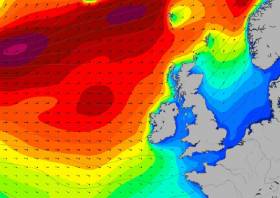Displaying items by tag: Storm Barbara
Storm Barbara Continues to Cause Ferry Cancellations
#Cancellations - Storm Barbara continues to cause ferry cancellations but also freight operations on the Irish Sea notably those serving Dublin Port in the busy run-up to the festive season.
Strong winds involving a ro-ro freight ferry arriving to Dublin this morning required tugs to assist while berthing at Terminal 5. A freight sailing tonight on a route to the UK has been cancelled.
The bad weather may pose a concern for passengers with possible further ferry cancellations closer to Christmas Eve in particular on the core Holyhead-Dublin services. Thousands of passengers make the trip annually from the UK to reach the capital and beyond. The route from Wales is operated by two operators, Irish Ferries and Stena Line.
At Dublin Port's main passenger ferry facility, Terminal 1 is where Irish Ferries fast-craft Jonathan Swift remains berthed in port due to cancellations as covered on Afloat yesterday. Sailings of the fast-craft's Dublin-Holyhead sailings today are cancellled due to the what the operator describes as 'adverse weather conditions'.
Irish Ferries advises that 'fast-craft' passengers will be accommodated on alternative sailings using the other Holyhead-Dublin cruiseferry Ulysses. Also currently operating on time is the ropax Epsilon.
Recently introduced by Irish Ferries is Oscar Wilde to boost capacity on the Dublin route which too however was affected by the bad weather. The cruiseferry’s morning sailing to Holyhead was cancelled and also this afternoon's sailing at 16.45hrs from the Welsh port to Dublin. Passengers are to be accommodated on tomorrow's 02.30hrs sailing, Saturday 24 December (Christmas Eve).
There have been no Stena Line cancellations reported so far today on their Holyhead-Dublin service which is operated by a pair of ferries. Stena have said that Storm Barbara is to bring wet and windy conditions to the UK and Ireland. The operator added that unfortunately this may cause disruption to some scheduled sailings today and Saturday (Christmas Eve).
It is advisable to check all ferry operator websites for the latest sailing information for times and (dates of operation given the festive season) and those on France-Ireland services.
Yellow Warning For Small Craft As Storm Barbara Approaches
#Weather - Met Éireann has announced a Status Yellow small craft warning for strong gales in effect today (Wednesday 21 December) ahead of Storm Barbara’s expected arrival at the weekend.
Southwest winds will reach Force 8 at times this evening and tonight on coasts from Slyne Head to Rossan Point to Fair Head.
That’s before the deep Atlantic depression, the second winter storm of the current season, tracks eastwards well to the north of Scotland, bringing wet and windy weather across Ireland — and the risk of stormy conditions in the coastal counties of Connacht and Ulster.
Achill Island Coast Guard advises mariners and residents in these areas to expect at least an Status Orange weather warning this Friday, as the projected Force 10 winds are forecast to last up to 24 hours, according to the Connacht Telegraph.

























































